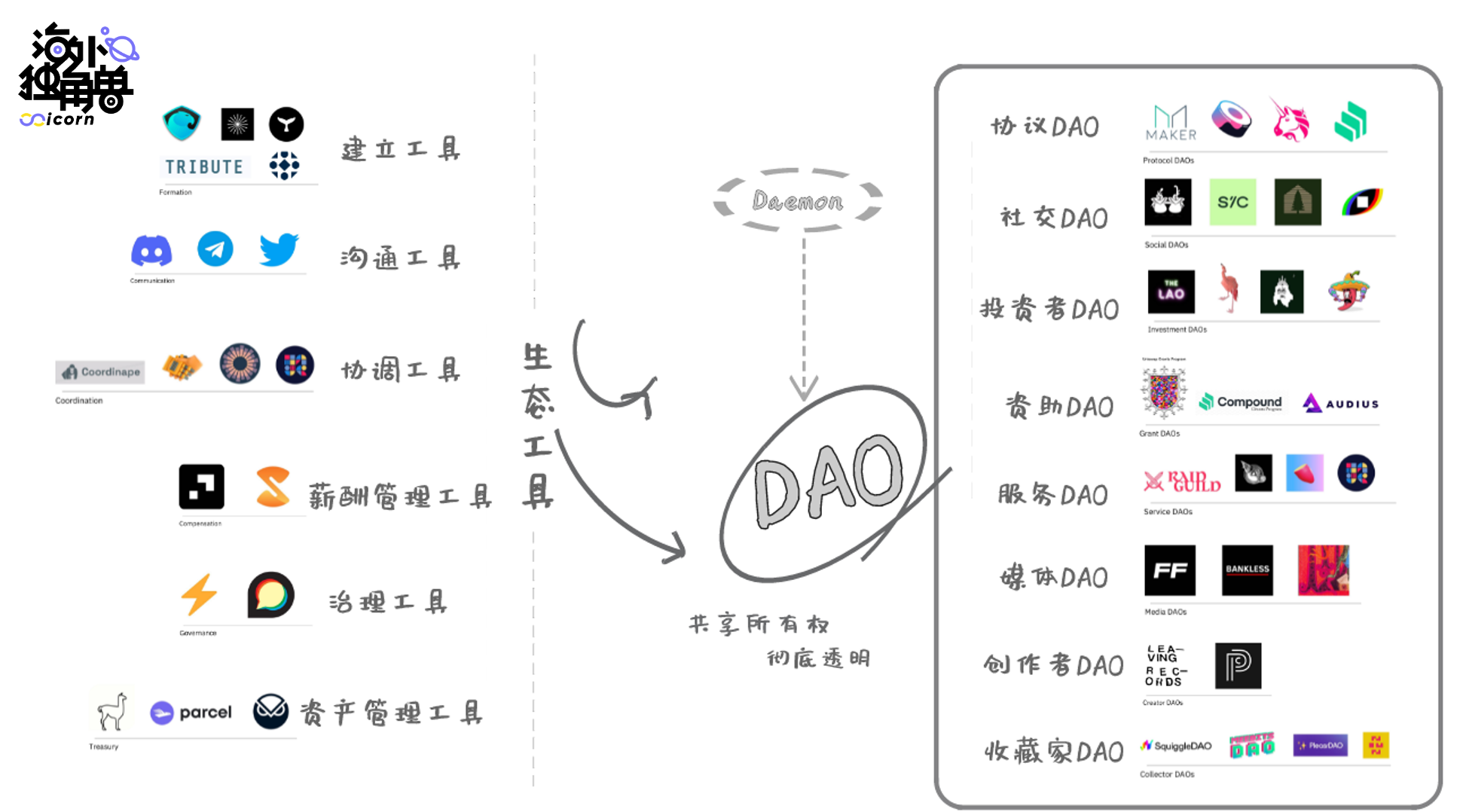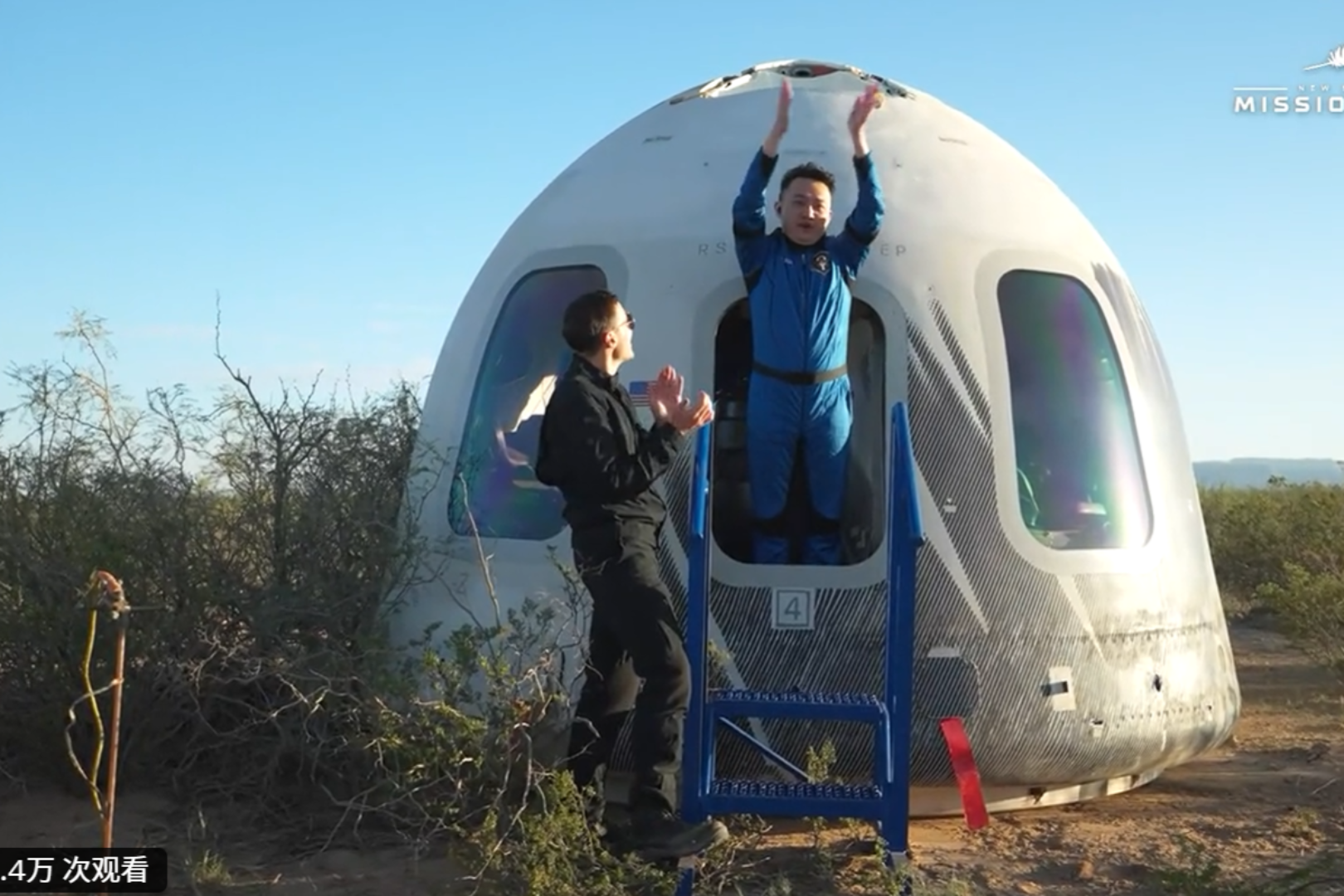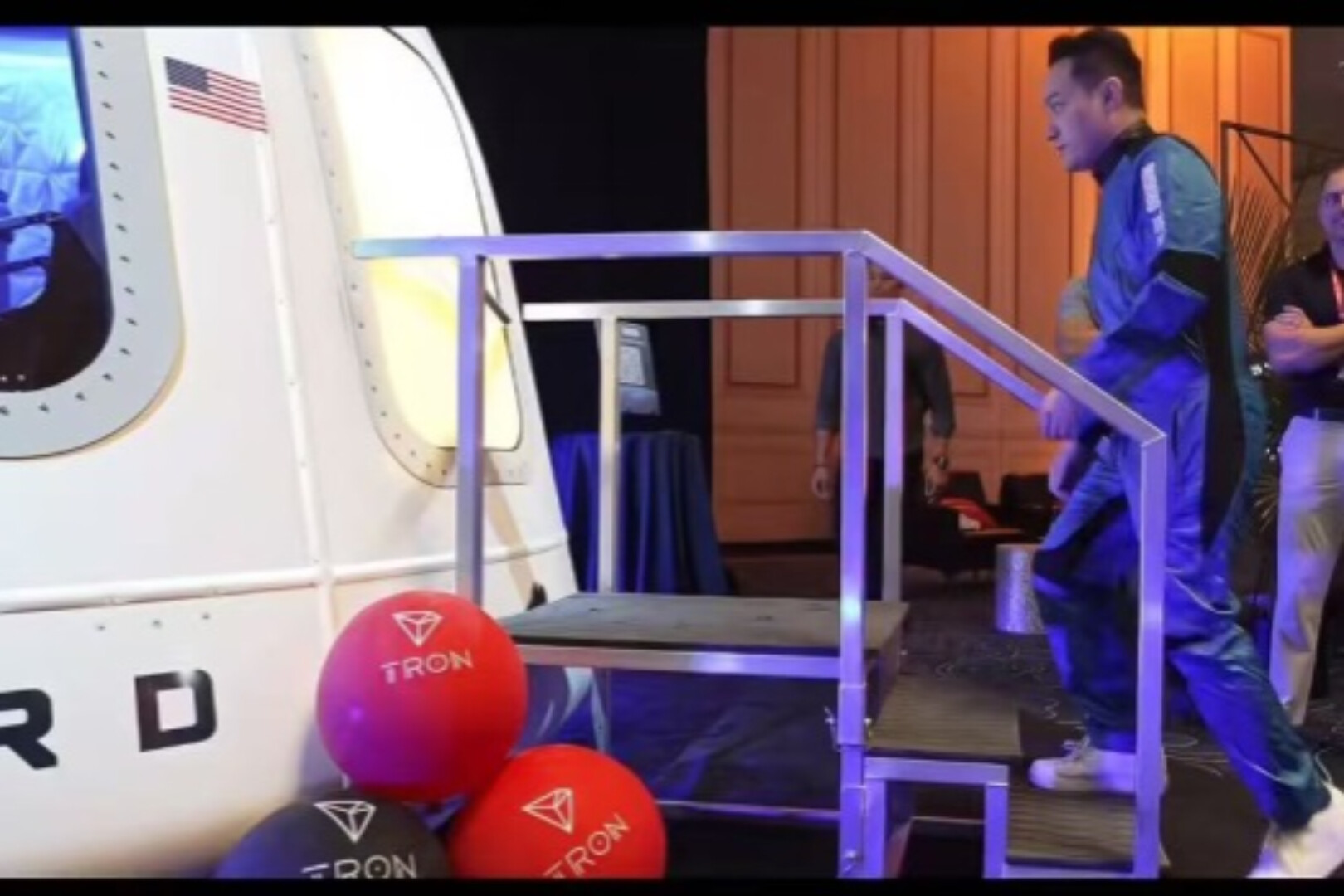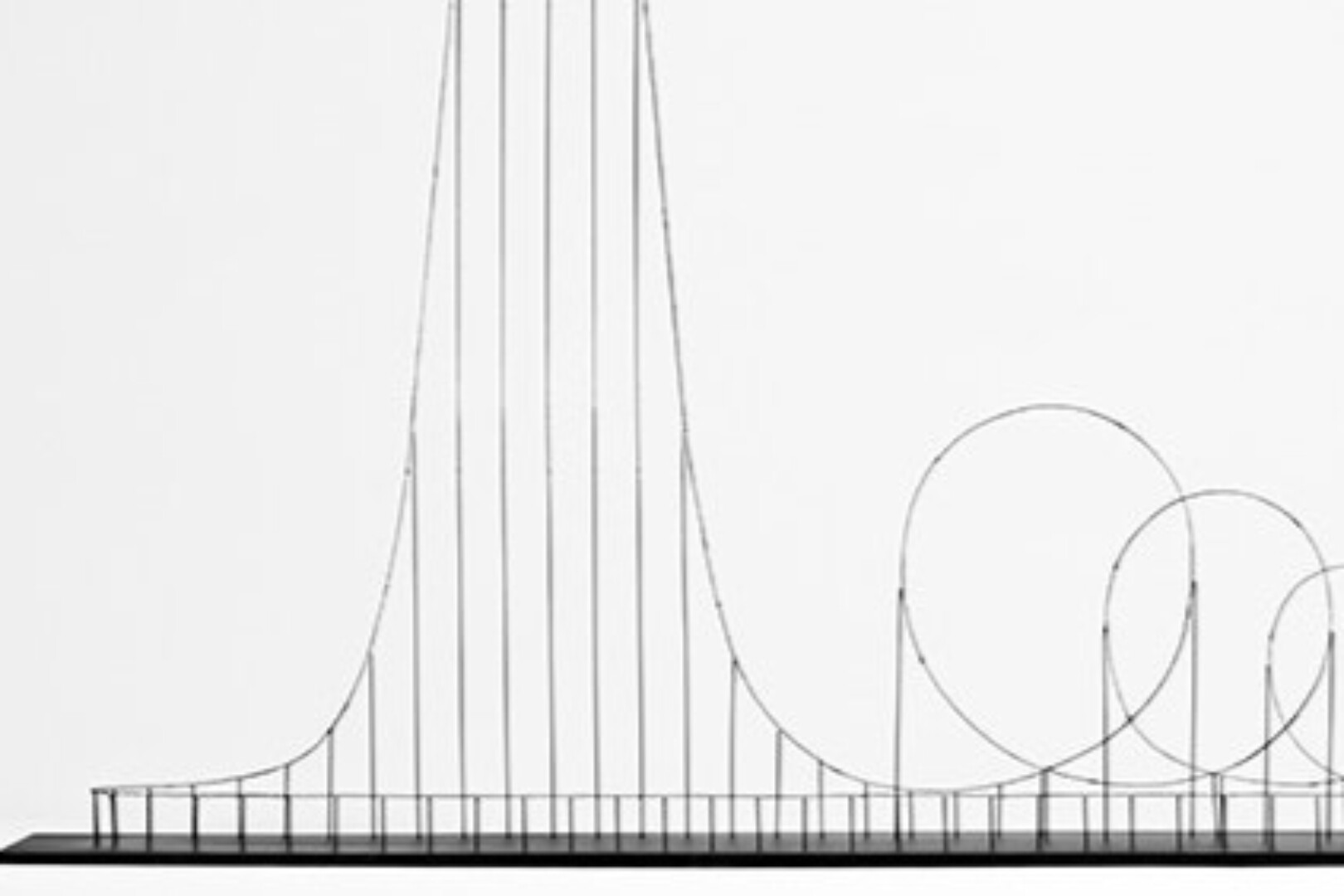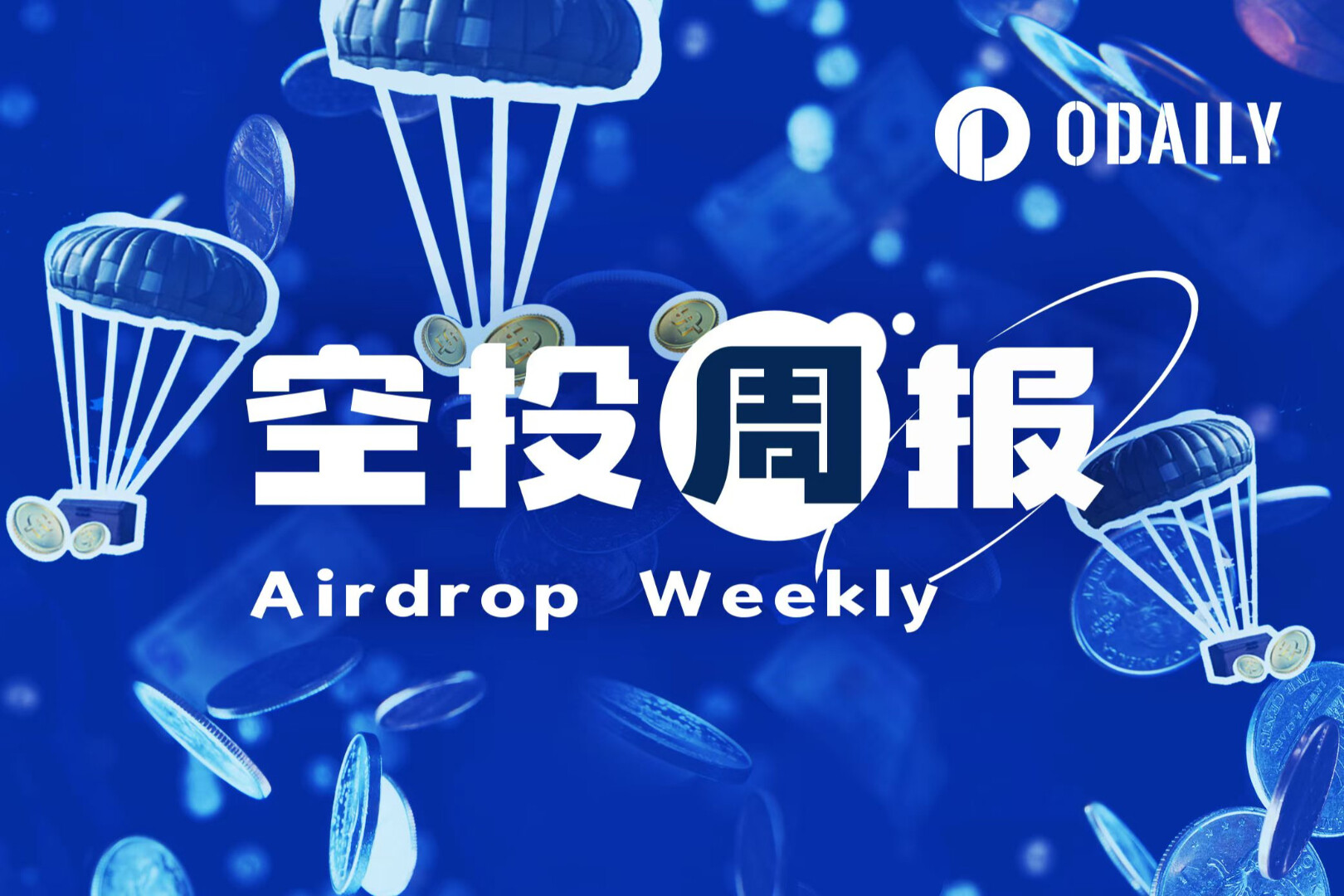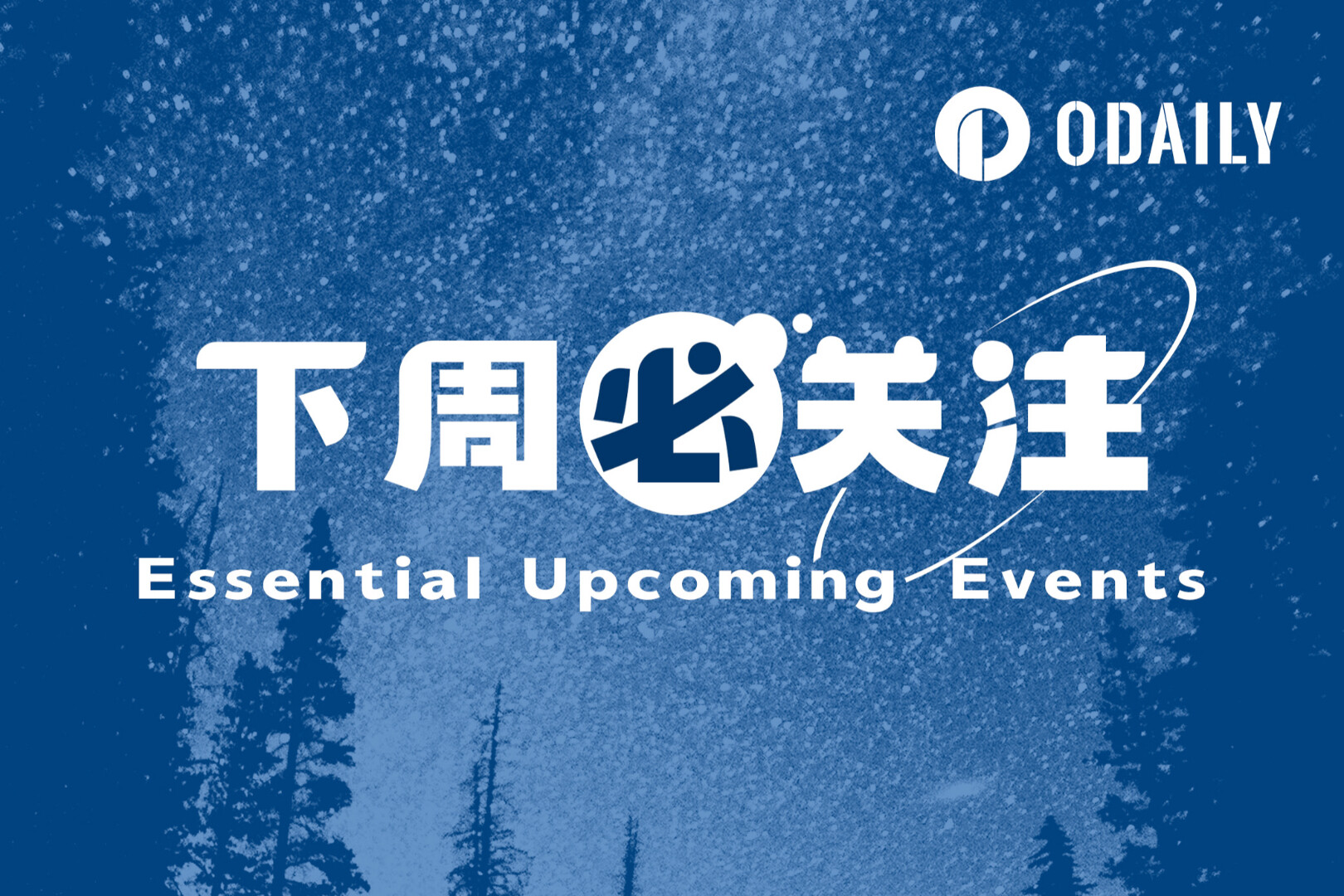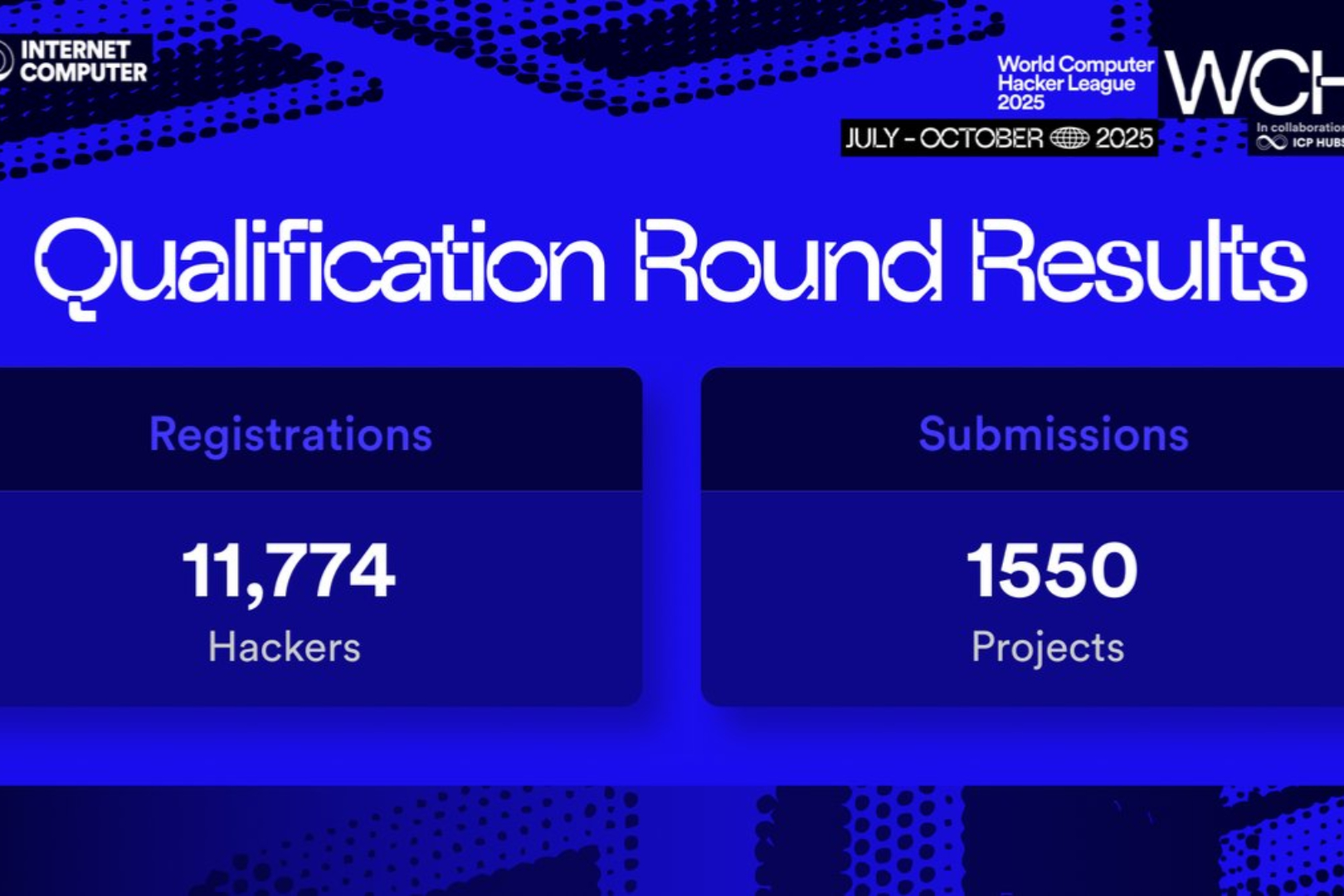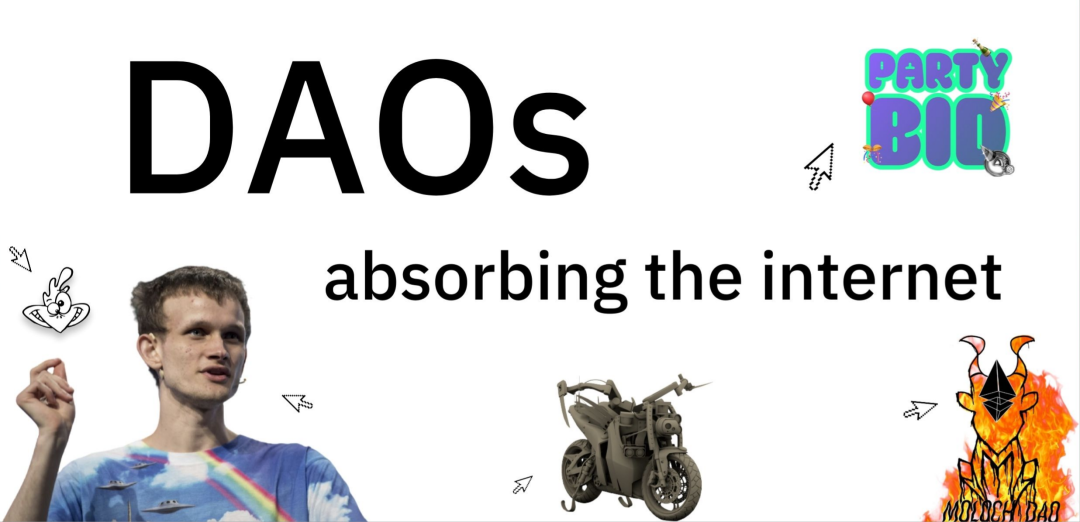
Content: Mario Gabriele
Compilation: Overseas Unicorn Team
Recommended reading:
Recommended reading:A comprehensive and in-depth analysis of how DAO swallowed the Internet (Part 1): Development history, definition and ecological overview
DAO (Decentralized Autonomous Organization) has become a core component of Web3.0. As a new organizational paradigm native to crypto, DAO tries to make up for the shortcomings of the existing corporate model and better realize large-scale human collaboration.
The fascinating thing about DAO is that it allows individuals to truly have "ownership" and unleash individual creativity. Not only does it incentivize individual participation, but it fundamentally changes how contributors think about their own efforts and labor. All work is built on the pursuit of a larger purpose, and the positive rewards of this purpose are jointly owned by the participants. Ownership fosters creativity, success, and a unique atmosphere within the organization.
Although it seems that DAO is still a complex and slightly vague concept, in a few decades, most people in society may work for these decentralized entities rather than centralized entities such as companies.
image description
exist
existpart oneThe following is the table of contents of this article, and it is recommended to read it in combination with the main points.
The following is the table of contents of this article, and it is recommended to read it in combination with the main points.
01. Why did you choose to create and participate in DAO?
Ease of capital formation
transparency
transparency
02. How to initiate DAO
excitation
distribute
governance
excitation
03. How to work for DAO
Choose your functional direction
Find the right job
cooperation
cooperation
get paid
04. Legal disputes
05. Voices of disapproval
06. Look to the future
Importance of DAOs
creativity
first level title
01.
Why choose to create and participate in DAO?
The problems that DAOs face and try to solve are not simple, but very complex. First of all, at any time, it is difficult to organize and coordinate a large group of people to move towards a common goal. This will not change with the birth and development of DAO. On this basis, DAO also introduces quite complex technologies And participation mechanisms, even linked to economic benefits.
So where does the enthusiasm for people to actively create and participate in DAOs come from?
In addition to DAO itself being worthy of participation, novelty and revolutionary, its value is also reflected in:
1. Easier to accumulate funds and form capital
2. Shared benefits
secondary title
Ease of capital formation
On the premise of "having enough capital", a community can invest or participate in projects they think are valuable, so pooling funds is a very important thing. In the past few months, DAOs of various forms have raised funds to participate in the collection of NFT, software development, the creation of Internet-native social clubs, music production, and even the promotion of reducing carbon emissions. In terms of raising funds, DAO is obviously simpler and cheaper than the traditional form of creating an investment fund.
Benefiting from the globalized financial infrastructure provided by blockchain technology, it is not difficult to create a collectively managed and controlled "public wallet". Even though encryption still leaves a lot to be desired, once someone has their own wallet and tokens, they can freely transfer those assets to any other account in the world.
secondary title
Shared revenue
DAO membership is linked to tokens, and membership information is therefore public. For many DAOs, you are considered an "official" member if you hold a specific NFT or a certain amount of ERC-20 tokens. Holding these tokens can also give members the ability to participate in governance, access, and realize value realization,This "monetization of value" is important because it gives people the option to earn a living by contributing to the DAO.
The financial benefits after the success of traditional projects are mainly enjoyed by the founders, early employees and investors, while the token model of DAO provides a more continuous and long-term reward mechanism, and the benefits after the success of the project are not only concentrated on early participants or members On the body, freelancers, service providers, and even customers serving the DAO can share these benefits.
However, as some DAOs become more and more popular in development, the price of tokens also rises accordingly. At this time, if you want to become a member of them, it becomes a matter of high threshold, which virtually reduces the original " openness".
as we are at
transparency
as we are atPart 1 "Philosophy"In part, most DAOs have and continue to pursue a culture of "transparency". This makes many DAOs look more like open source projects:From creation to communication, joining, participating in transactions and governance, a series of processes are open, and more meaningful interactions are bound to be born in it.
communicate
communicate
member
member
On-chain, you can see how many token holders there are, understand membership value, and view the history of token transactions.What's more interesting is that with the support of the token system, DAO can also reward members of other DAOs, for example, Rabbithole can provide rewards to anyone who holds $FWB tokensgovernance
governance
first level title
02.
How to initiate a DAO
Although it is by no means a panacea, the DAO structure does have obvious benefits. I believe the above content has successfully aroused your interest in participating in and implementing a DAO. Next, you may wonder how to initiate a DAO.
It is much easier to start a DAO than to maintain a DAO with long-term value (because DAOs are just emerging, and people don't know what a durable and great DAO looks like).
Contributor Jess Sloss summed up the process of launching a DAO on Twitter:
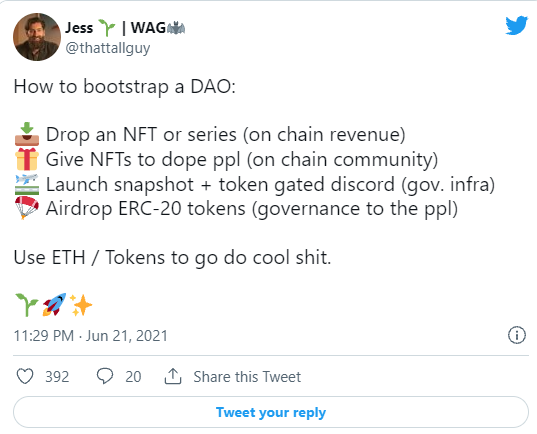
But these are just the surface,To understand how to build a DAO of real value, here are four more things to consider:
1. Summon
3. Governance
3. Governance
secondary title
call
What needs to be clear before launching a DAO is why people are willing to join?
The front of DAO is full of unknowns, and those who choose to join it need to be prepared to face adversity and fight against it.Therefore, a common direction of struggle is needed to ignite the strong enthusiasm of members, join DAO, and provide long-term motivation to face the unknown.
List the ultimate vision of several DAOs to attract members to participate:
KrauseHouse:Committed to becoming the first NBA franchise organization owned and managed by a DAO;
GitCoin:The core objective is to develop and finance "digital public goods";
FWB:distribute
distribute
After attracting attention, the next thing to consider is how the ownership of the DAO should be distributed."Assigning ownership" is not a static single task, but a critical design decision.
Some DAOs distribute ownership through tokens from day one, like NFTx andSushiSame. Other DAOs choose to build with smaller teams and then distribute ownership after the product or community proves the need and potential, such as Uniswap and Compound.
At the end of the day, there are a number of ways a DAO can assign ownership to contributors. One method is "airdrop", which is to choose how to distribute tokens based on members' historical operation behavior (such as the behavior of purchasing NFT). The other is through “bounties”; Rabbithole, for example, offers tokens when users learn about crypto projects on its platform. There are also some DAOs that support the direct purchase of tokens on exchanges to obtain corresponding ownership, such as Uniswap.
If properly designed, the ownership of the DAO will be passed along with the tokens to individuals and organizations that share the same values, thus ensuring the continuous development of the DAO.
Here are a few different examples of DAOs assigning ownership:
Squiggle DAO :The premise of joining Squiggle's Discord is to first own a Squiggle NFT, and then, $SQUIG tokens were airdropped to early contributors in the community;
SuperRare :Distributed $RARE tokens to artists and collectors using its NFT platform;
FWB :governance
governance
Deciding how to make decisions as a group is an important stage in the process of starting a DAO, and the decision-making process can be called the "governance structure". "Governance" is a very important issue in the field of Web3.0, and V God, the founder of Ethereum, has also paid attention to it recently.
In short, "governance" is the process of establishing legitimacy in the decision-making process of a DAO or its "governance structure".
There are many types of governance structures,The most common decision-making method is "token-weighted voting". In this design, one token represents one vote. Members express their preferences and attitudes on various issues through proposal tools (such as Snapshot),These voting results are either executed automatically, or confirmed through a multi-signature process and then uploaded to the chain for implementation.
On the basis of "token + weighted voting", some DAOs have chosen a governance structure similar to "direct democracy", that is, members can vote on most proposals. Of course, there is also a governance structure of "representative democracy", which can obtain A core team empowered by members votes on decisions on behalf of the membership.
The "governance structure" chosen by a DAO is not absolute, and usually evolves and iterates with its own development.
In the context of DAO, "how a proposal becomes a formal law" needs to go through the following process:
1. Discussion takes shape:A member puts forward an idea in Discord, and for this idea, members continue to talk on Discord and establish a preliminary consensus in the process;
2. Formal proposal:Based on the content on Discord, members can further discuss formally in Discourse, and finally form a proposal;
3. Vote:With the help of voting tools such as Snapshot, DAO token holders vote on proposals within a specified time;
4. Proposal implementation:Once the voting is over, the corresponding voting result will be executed by the operation.
secondary title
excitation
DAO ensures the realization of goals by organizing and coordinating everyone's contributions, and appropriate incentives drive members to continue to make contributions. In the scheme design of the incentive mechanism, DAO's first choice is usually native tokens, which endow DAO early contributors with a sense of ownership and belonging to DAO. While these tokens may not have immediate value in the marketplace, they represent the relative value of an individual's contribution to a new organization, and certification that they are all able to share in the DAO's value.
Not all rewards are monetary. DAO incentives mainly fall into the following categories:
Native Token Rewards:These are the types of tokens mentioned above that confer ownership and influence on the holder;
social capital:Valuable members may earn certain titles via NFTs on Discord. "Moderator" or "leader" is proof of social status within the scope of the DAO;
Token payment:Contributors receive more liquid cryptocurrencies such as USDC or ETH. This is more of a "salary" as the coins are more liquid and can be easily exchanged for local fiat currencies.
While the above rewards may be attractive enough, if the DAO is to continue to grow and scale, the DAO needs to find a way to make the incentives they pay contributors enough to keep them alive.
One way is to obtain the ability to circulate in the market for the governance tokens issued by DAO. Tools such as Uniswap and Sushi make this possible, but these products are complicated to use. In addition, retail investors are excluded because of the transaction volume threshold, and only very mature organizations can meet the transaction volume requirements.
Most DAOs will choose to reserve USDC or ETH in their vaults for payment. How to do this? DAO can exchange governance tokens for higher liquidity coins if the conditions are met. Or a DAO could do this by generating on-chain revenue. For example, a DAO can sell NFTs for ETH, which is stored in the DAO's vault and then paid to contributors. DAOs can also provide services to certain organizations in exchange for compensation, such as blockchain development.
Most DAOs spend a lot of time building reward mechanisms. DAO is decentralized. Unlike companies, DAO does not have the concept of "boss", no top-down structured salary system, no clear division of functions, and no centralized human resources department to participate Salary design.
Therefore, there are many mechanisms that DAO can adopt, usually a mixture of the following:
bounty:Some work tasks are designed to include the setting of the established bounty, and the contributors who complete the work can get those token bounties;
Grants:Contributors can earn a certain amount of tokens by taking on and completing certain challenges, usually harder and less well-defined tasks;
Coordinape cycle:Coordinape is a decentralized salary management system designed by Yearn for the needs of DAO. It can use the tokens raised by other contributors to reward other people's contributions;
salary:Regularly paying salaries to core team members is also one of the ways, usually in the form of a mix of USDC, ETH and native tokens.
Although both Sushi and Index Coop have formulated structured recruitment and compensation methods, each DAO's compensation model, process and tools are usually built by itself, so from a macro perspective, there is no clear gameplay yet.
In summary,There are currently only one or two common technology solutions for each stage of DAO needs - a far cry from the rich SaaS tools that compete to serve every market segment.
Although as an emerging organizational model, DAO has challenges it needs to face,first level title
03.
How to work for DAO
If you are not ready to launch a DAO, you can also choose to join one of them as a "contributor". We created a virtual job application process to quickly understand how to participate in DAO work:
Step 1: Determine your functional direction
Step 2: Find the right role
Step 3: Onboarding
Step 4: Cooperation
secondary title
Choose your functional direction
What kind of careers exist in the field of DAO? What kind of talents do they need?
The good news is that the reality is simpler than you might think. Although DAOs with different targets have different requirements for contributors, there are still some common requirements:
Community Manager:The community nature of DAO makes this role particularly important, moderators and administrators are the glue that holds the entire DAO together and helps it move forward.
"Hire" Personnel and Promoters:Especially in the early days, DAOs need to promote themselves to attract good people to join, so "recruiting" people is very valuable.
recorder:A large amount of information is generated around the DAO every day, and the "recorder" is responsible for helping the DAO to clearly record this information, contributing to the promotion of the DAO and the accumulation of internal knowledge.
artist:NFTs have become a common way for DAOs to generate income, so artistic flair and sensibility are likely to be highly sought after.
engineer:Some DAOs have already started building their own tools or other products in the Web3.0 space. If you are a programmer, or want to be a programmer, DAO provides such an opportunity.
Financial managers:As we mentioned, DAO also manages a large amount of financial assets, and they need dedicated financial managers to complete the management of funds and expenditure planning.
secondary title
text
How to find job openings in the world of DAOs? The truth is, there is no stylized process or product to address this need.
secondary title
onboarding
The onboarding experience tends to vary from DAO to DAO. High-quality organizations usually excel at this; after all, newcomers are better able to contribute if they have enough backing. Some DAOs even have special orientation calls for new members, similar to a university open house.
Index Coop, a decentralized asset management organization, hosts weekly newcomers meetings and provides a detailed guide called “Cooper Owl Quest” for its members to learn how to get started.
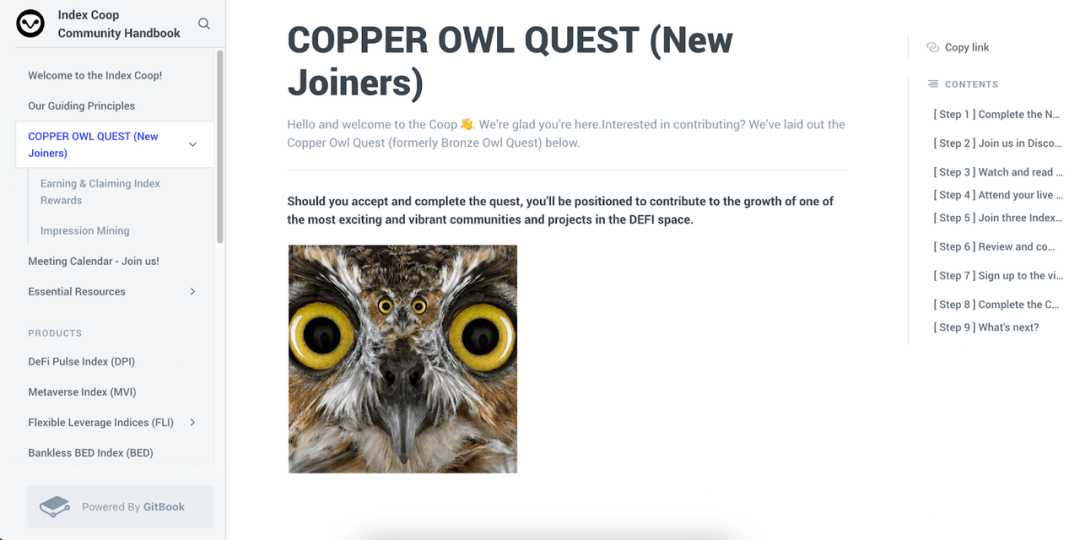
cooperation
cooperation
Once you're in it, you can contribute to the DAO you're part of. Since the decision-making power of DAO is distributed, there is no centralized management team that defines the workflow, and most of the work is done through collaboration. Everyone has the right to express their vision for the future, and leadership teams often come from people who can understand the needs of the community and work hard to address them.
This bottom-up approach can be seen everywhere in DAOs. For example, a team of six dedicated Sushi contributors applied for a grant to help troubleshoot user failures and create a multilingual customer service portal.Initiatives like this are common in DAOs — contributors spot a pain point in the Sushi ecosystem, proactively propose a solution, request and receive resources, and start building.
How is this work done?
As we mentioned, Discord and Discourse provide platforms for communication and discussion. Most of the rest of the collaboration happens on products like Google Docs, Notion, Airtable, Figma, and Github.
Although the above products or platforms are very powerful, none of them are built for Web3.0 teams, nor can they fully meet the work needs of Web3.0 teams. For example, these platforms store user information on centralized databases and typically assign access based on an individual's role within the organization. But the way DAOs operate is obviously different. In addition to members wanting to remain anonymous, there is no power hierarchy corresponding to the distribution of authority.
secondary title
get paid
In the "How to start DAO" section, we mainly introduced several different types of rewards that DAO contributors can get.
Another notable issue is that DAOs sometimes tie compensation to certain KPIs. For example, the synthetic asset project UMA cleverly combines the project party’s possible needs for KPIs, and designs an incentive tool with an option structure, so that token holders can help the project achieve certain KPIs faster. If the target is reached before the expiration date , you can get more rewards.
first level title
04.
legal controversy
As a system model that grew up based on the blockchain, the operation of DAO is very different from the assumptions of traditional business entities: for example, DAO is not managed by the board of directors or managers, but is managed by means of democratic or high-participation processes or algorithms , In addition, DAO's tentacles extend to the world, bonding thousands of members together through the Internet. DAOs typically try to avoid written agreements or other forms of legal formality, and members primarily use software and code to comply and manage their affairs.
While most jurisdictions don't have a definition, Wyoming (which pioneered the concept of a "limited liability company") recently passed a law granting DAOs legal corporate status as long as they are designed to be a Wyoming corporation. limited liability company. This forward-looking view provides liability protection for DAO members. Because without such safeguards, a DAO could be viewed as a general partnership, with members personally liable if things go wrong. In addition to Wyoming, many other jurisdictions are also starting to think about the future of DAOs. The LAO we introduced in the previous article is also an example of a DAO utilizing a limited liability structure.
Tribute Labs (formerly OpenLaw) has been exploring other structures, including UNA (Unincorporated Not for Profit), a UNA for groups wanting to conduct some not-for-profit activities to develop principles of action.
image description
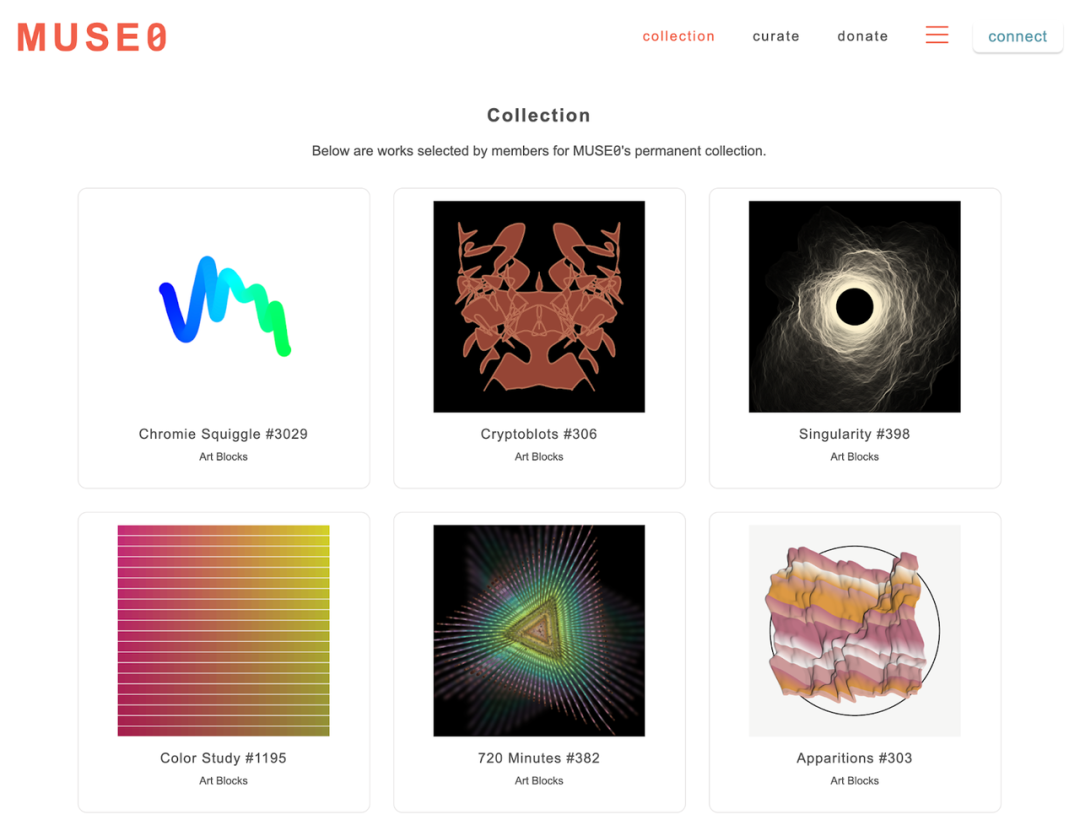
Muse0 series
No paperwork is required to start a UNA, but if the unincorporated organization starts to make a profit, it effectively becomes a general partnership.
DAOs are growing in importance, and there are early signs that blockchain-based governance will have a significant impact on the way companies are governed, whether by digitally altering traditional governance mechanisms or providing a new concept for corporate organization.
first level title
05.
voice of opposition
While there are many reasons to be bullish on DAOs, it is true that the development of DAOs is still in its early days. If DAO is to be popularized on a large scale, it will take some time for it to move forward.
DAOs are not perfect. Although the contemporary enterprise represented by the "corporate model" has its own problems, and the emergence of DAO is to correct these defects, we should not completely negate the corporate structure, otherwise we have not really made progress from past experience and lessons.
A qualified company must assume two key responsibilities:
1. Fiduciary Duty.Corporate ownership and management allocations do not necessarily overlap completely. Therefore, those responsible for corporate decision-making, such as executives or the board of directors, must act in the best interests of the shareholders (the true owners), not their own.
2. Minority shareholder protection.The number of shares owned by different shareholders in a company is different, and the benefits enjoyed by each shareholder should be linked to the proportion of shares they hold. Large shareholder groups cannot force other shareholders to comply with demands that reward the majority excessively at the expense of minority shareholders.
These are the basic operating principles of a sound business, and failure to follow these rules can lead to a host of legal conflicts. But in the operation of DAO, it is difficult to fully implement these.
On the one hand, in the event of a breach, the courts cannot be relied upon to rule because that does not exist.Furthermore, since a DAO is essentially a trustless computer program that runs on a smart contract, it cannot determine whether a proposal satisfies fiduciary obligations, or whether minority shareholders are adequately protected, as such judgments are inherently subjective , cannot be represented well by the program flow.
What's more, if the DAO's voting rights are owned by people with bad intentions, it is a serious problem. For example, if a bad actor (or malicious group) succeeds in gaining 51% of the voting weight (or over whatever threshold is set by the decision), they may propose and approve changes to the to obtain unreasonable profits.
DAO may not have the ability to prevent this situation, especially at the software level, people in the community will not be able to protect themselves in the above situation, so a trusted external third party with the ability to evaluate and judge this kind of problem needs to step in.
Anonymity further complicates matters. Many people participate in DAOs anonymously, meaning there is little reputational risk for bad actors, the openness of DAO increases the risk to a certain extent. Given the chance, even some people might think it's worth leaking DAO's resources, especially if they're running without imputation.
Why aren't we seeing more attacks like this? In part, this may be due to other motivators at play.In many DAOs, the token supply is concentrated in the hands of a small number of founders or reputable investors. These people often reveal their identities for longer-term considerations, which also means that they may pay a reputational price for some actions.In addition, these giant whales are also capable of dealing with some attacks on DAO.
In many cases, those responsible for managing the DAO's multisig could also relatively easily act against the interests of the community. However, the social capital accumulated in the world of DAO and Web3.0 virtually prevents this kind of behavior. However, whether these people have made some decisions out of selfishness is unknown and cannot be stopped.
quit
quit
Moloch DAO has an "exit" mechanism that allows token holders to withdraw from the DAO. More importantly, "exit" will not affect the token shares that members already owned before exiting. Members can leave at any time with their tokens if they disagree with the decision the DAO has just made.
So when an attack occurs, the existence of this exit mechanism forms a kind of "protection". If DAO contributors think an attack is underway, they can leave with their funds instead of being forced to join. So even if the DAO's attackers amassed a 51% majority of decision-making power, they might not be able to get any funds.
The "exit" mechanism is not friendly to DAOs holding non-fungible assets such as NFT. For example, if 100 people invest 1 ETH each and jointly buy some Bored Apes, when one of the members decides to leave, how will his fragmented NFT shares be distributed? This matter is not simple.
secondary title
veto
There are also some DAOs that prevent destruction through vetoes. When threats to the DAO arise, trusted entities or mechanisms are triggered to step in to ensure the legitimacy of proposals and deter malicious behavior.
For example, the founder of Nouns DAO can veto malicious proposals, although Nouns plans to gradually revoke this right over time, which also shows that this mechanism still relies on social discourse rights related to "people" rather than code.
Some protocols try to address the problem head-on by adding a variable of "subjectivity". For example, Aragon, which provides DAO establishment and governance tools, designed an Aragon Court to help resolve disputes through a network of "guardians." When a problem arises, the judgment can be handed over to this independent group, and members of the organization will also be rewarded for making a fair judgment. Kleros' "Judicial Protocol" is a similar solution.
Beyond the threat of attack, the DAO must also resolve some controversies surrounding the validity of its structure: Is a decentralized approach likely to yield the best results?
High-impact startups have summed up a default execution playbook in which leaders at the top drive the direction of the organization, intellectual property is proprietary, hiring is structured, and confidentiality is paramount. Over the past few decades, this approach has yielded some fantastic results.
DAO tends to have a completely transparent flat structure, and therefore develops on another behavioral model. This organizational method has proven to be very effective in an environment that is naturally decentralized (both Bitcoin and Ethereum can be considered as DAOs. ), but it is unclear whether it is suitable for other types of tissue.
looking to the future
06.
looking to the future
Perhaps the most exciting thing about The DAO is that, until today, we have only scratched the surface. Faced with a new technology like DAO, what purpose, method and scenario should people use it? This matter is worth exploring in itself, and in the process we are more likely to envision the future represented by DAO.
secondary title
Importance of DAOs
The widening gap between rich and poor is one of the greatest headwinds facing society, and the “post-COVID era” that has accompanied COVID-19 will only exacerbate the problem. This is not just a question of social value orientation, but also an economic question.
Labor and wages are not the optimal solution to building sustainable wealth, but striving for asset ownership and access to capital is.Historically, there has been a disproportionate relationship of returns between those who own capital and those who provide labor in exchange for a fixed wage. So if you want to become rich and gain financial freedom, having assets or capital must be more important than labor.
This is why the Web 3.0 era is so important to many people, as we have discussed,One of its core pillars is "ownership". Through the combination with Crypto, the world of Web3.0 has the potential to help millions of people move from the traditional employment relationship to real "ownership".
secondary title
creativity
As many of us know, people of all walks of life are increasingly worried about one thing: With the advancement of automation, artificial intelligence and robotics, will many of today's jobs eventually be replaced by robots? This fear is not unfounded, but the explosion of Web 3.0 and a series of DAOs may give birth to hundreds of new industries, thousands of new organizations, and millions of new jobs that did not exist before.
"Creativity" may be especially affected. As the labor of "rote learning" is automated, people with greater acuity will emerge from the process. This increasingly mechanized world will increasingly encourage human connection, even through the digital realm.
DAOs are the perfect embodiment of both trends.
The Creator DAO empowers artists and fans to interact and create wealth. In return, much of it will be shared with those who helped generate it.
image description
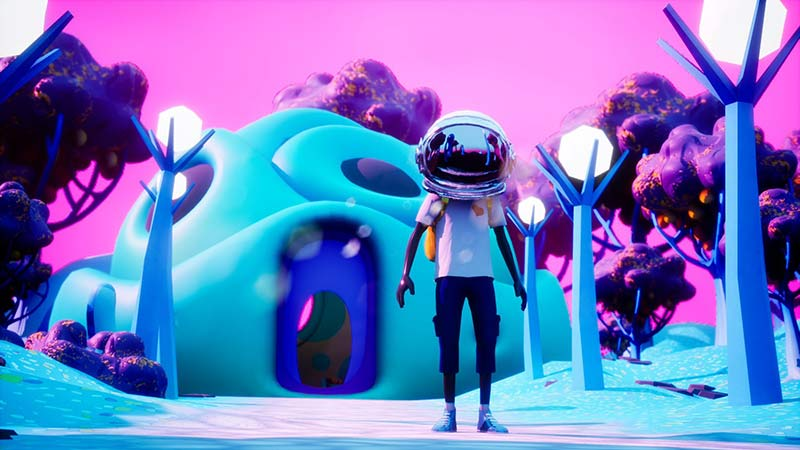
secondary title
new organizational structure
As of now, all traditional assets are a set of effective legal structures, and the rights of asset holders are endowed by corresponding laws and are protected and restricted.
As more and more assets are transferred on-chain, smart contracts and programmatic incentives will replace the legal system as a way to secure ownership.Likewise, DAOs will replace legal entities as the primary method of coordinating these assets. Individuals will manage their on-chain assets by creating DAOs, rather than by establishing a company.
DAOs are a paradigm shift from traditional corporations because they are global from the start, require no permission to join or contribute to, and minimize issues such as identity, employment contracts, job interviews, and even real-time compensation friction.Although there are still many problems in the practice of DAO at present, we have every reason to believe that these problems will be solved over time.
In short, encryption provides stronger protection for assets and the globalized financial system, and anyone can use encryption technology to more efficiently convert assets into capital.
It remains to be seen whether the DAO will develop as expected. The crypto world of the past decade has been stranger, darker, and more magical than we ever imagined, and the next one may bring an even bigger shift.
But a rational choice must be to continue to believe in strong, positive change. Be open to a new and futuristic field, someone will find a way to improve the livelihood of many, a few or many, and slowly someone will gradually realize that maybe they are not working for a "corporation" but For The DAO, an ever-changing digital presence that would eventually swallow the internet.
Reference
https://www.readthegeneralist.com/briefing/dao
This article is from Overseas Unicorn, reproduced with authorization.
